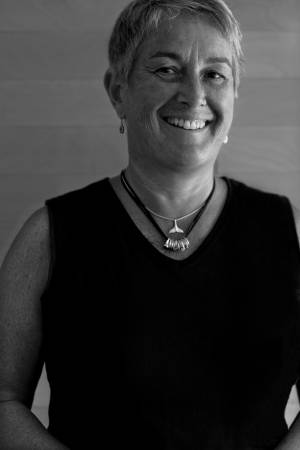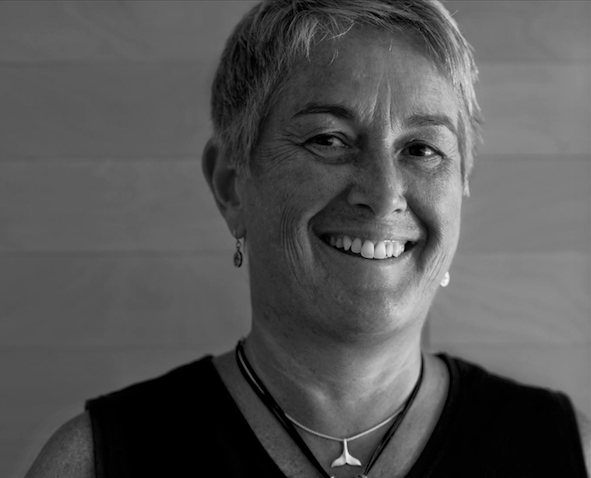Rebecca McBride, a long-time friend of Smile Politely who recently retired from the Krannert Center for the Performing Arts, discusses her career in Champaign-Urbana and what’s next in retirement.
 Smile Politely: What are your connections to Champaign-Urbana?
Smile Politely: What are your connections to Champaign-Urbana?
Rebecca McBride: I was born here. I got my undergraduate and graduate degrees at the U of I. I was thinking of moving away at one point, but then a personal relationship kept me here. That was great, because I love this community.
SP: You’ve lived here your entire life. What do you think people might not realize about Champaign-Urbana?
McBride: Having the U of I here is an amazing resource that lets people have a much more global, urban experience than might otherwise be possible in a community of this size. It makes the opportunities feel very large here. As I’ve grown older, I’ve realized how special this place is. I’ve grown to appreciate how down-to-earth people are here, and how that quality is often coupled with incredible intellect and passion. I’ll never leave at this point.
SP: Tell me about your career trajectory.
McBride: I did my undergraduate degree at the U of I and my MBA there shortly thereafter. During that time, I really fell in love with strategic planning and marketing. My first position was as the Marketing Director for the Urbana Park District. That’s a fabulous organization, and it gave me the basic principles for operating an organization and serving a mission. After that, I became the Marketing and Public Relations Director at Christie Clinic. Again, I learned a tremendous amount and honed my skills as a professional with the help of a great community. Then, I was asked by a good friend if I would apply for a recent opening at Krannert Center. I’d always loved Krannert. I don’t have a particularly strong background in the arts, although I took piano lessons and believe that marketing and advertising are really creative. But I’ve always been drawn to creativity, so I decided to apply, and I ended up getting the position. Krannert is an amazing organization. It has been my professional and spiritual home for the past 24 years.
SP: You mentioned that your background was not in the arts. Why, from your perspective, do the arts matter?
McBride: First of all, I think the arts are important because they open people up to different viewpoints and different worldviews. The arts so often tackle hard issues: things that are hard to talk about or hard to process. Somehow, through the arts, we understand issues on a deeper level. I think that’s critically important right now. There are many problems in our society, and many issues are divisive. The arts are one way to learn about different cultures, which helps us to grow as human beings.
Also, the arts require us to use parts of our mind that are underutilized, which helps us become holistic thinkers. Our society has really downplayed the importance of holistic thinking. I believe that reducing and eliminating arts programs in our schools is a really, really bad decision for our society, and I think we’re seeing the effects of that now. I think that some of the cultural issues that are going on, and how we’re treating one another, is a result of us cutting back on the arts in education.
Finally, the arts open our eyes to what’s in our environment all the time. It’s easy to walk around and not see the beauty that surrounds us every day. I think we need that connection to our world, and aesthetics helps us do that.
SP: What are some of your best memories from your time at Krannert?
McBride: What pops into my mind when I think about my time at Krannert is how the organization opened its doors to a wider variety of people in this community during my time there. When I first got there in 1992, it had a very different feel. Everyone knows that the performing arts can seem elitist, especially when they take place in an “ivory tower” like the U of I. But when I came to Krannert, it was very clear that many people were working on making the center comfortable for everyone. One early success we had with that issue was a program called Summer Swing, which was a public, outdoor event on a Saturday afternoon with local bands and artists. There were umbrellas and hotdogs. It was just a nice Saturday afternoon concert, but at the time, it was really new.
Shortly after that, we did a big event called AfricaFest. It presented an international tour of African musicians. We put up a huge stage behind Krannert and did an outdoor concert from 10 a.m. to midnight, which featured tons of amazing African artists. It was so hot — around 103 degrees. But it was a moment when you saw people from all different walks of life engaging with art. I think that was emblematic of what was to come for Krannert.
Another highlight is that I spent a lot of my career helping to enable Krannert to support the creation of new artwork. During my time at Krannert, we worked with many artists, sometimes in the beginning stages, and sometimes midway through or toward the end. When I saw artworks being premiered, I felt that Krannert had contributed to something really important.
SP: On a separate subject, you have been out as a lesbian since the 1980s. What was that like, and what has it been like to see attitudes about LGBTQ issues change so radically in your lifetime?
McBride: When I was growing up, I think many people like me, who was identified as a lesbian, felt some degree of social or cultural pressure. At that time, many of us felt that we had to internally fight that identity because we didn’t want to admit it about ourselves. Being involved in the University, and particularly in the arts community, helped me become comfortable. The arts are very welcoming; they embrace everybody.
Since then, I have been absolutely amazed. We’ve made such good progress. I never thought I would have the opportunity in my lifetime to marry my partner. Once things started changing, they moved so quickly. There are still pockets of the community that are less than accepting. But it’s unbelievable how for the most part attitudes have truly changed. At the same time, there’s still a lot of work to do. We’re seeing that now with the debates about transgender people and bathrooms. I’m so happy, and I’m so proud of this country, for saying we want to be welcoming of more diversity. But we have still a tremendous way to go.
SP: You mentioned your marriage. What was that like?
McBride: I’ve now been with my partner for 22 years. When the law changed and we could get a civil union license, we did that as soon as we possibly could. Then, when it became legal to get married in Illinois, we went to the courthouse and they gave us a new piece of paper. It was a marriage license retroactively dated to the day we originally received our civil union. We took a selfie in the parking lot and that was it. When you’ve been together that long, it’s really important to get married, but at the same time it doesn’t change anything. We already felt married. In some ways it felt superfluous, but we wanted to take that legal step in recognition of the people who fought so hard to get that right for us.
SP: Tell me about your community involvement outside of your career.
McBride: I’ve been involved in the Eastern Illinois Food Bank, Habitat for Humanity, Allerton, and the Community Foundation of East Central Illinois Board. Every time I’ve gotten involved in community organizations, I have a deeper respect for people who live here and the work that they do.
SP: What will you do in retirement?
McBride: All my life I’ve had a passion and a deep connection to nature. I believe it is important to live respectfully within an ecosystem rather than to try to dominate it. And I’ve always loved to write. So, recently, I’ve combined these two passions in a nonprofit that helps people understand how to be “ecofluent,” a term I have trademarked. I have defined it as understanding the relationship between humans and our environment, and particularly, understanding the role that money plays in that relationship. I have a new website, ecofluent.org, which comes out in the next couple weeks. It is a place where individuals can find tools and resources to help them understand where to spend money wisely to support companies and businesses that are being responsible in supporting the environment. It easily provides quick information to anyone who is interested so they can spend their money in the best way they can. I’ve been working on this project for a long time. So, you could say I’m retired, but I don’t feel that retired.








